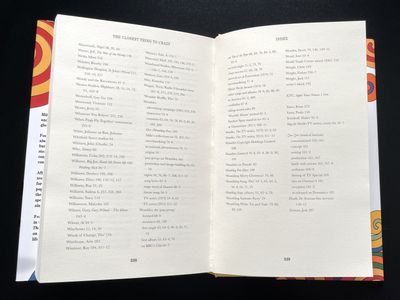Inside the Womble suit: Mike Batt publishes his autobiography

For many years, Mike Batt has teased his fans with extracts from an in-progress autobiography on his website and social media, perhaps testing the waters. Now at last, the finished item is ready to be published, coinciding with the 50th anniversary of the Wombles pop group that gave Mike his first big success.
The book cover image makes it clear that he’s still well known as the ‘Wombles Man’ despite his long and varied career, while committing the cardinal sin of showing a furry Womble with its head off (in a 1974 stock photo from the Mirrorpix archive). Of course, this cleverly recognises the interplay between the Wombles and the ‘Human Being’ Mike Batt – brazenly breaking a rule that Mike himself mentions twice during the course of the book.
The story kicks off with a dramatic flashforward to a life-threatening incident, like all the latest TV pre-credits sequences, before settling into mostly chronological memoirs. The first few chapters covering Mike’s early life and determination to make it in the music business are quite lighthearted with lots of quips, and were so enjoyable that I actually forgot about the Wombles era coming up next.
There are two whole chapters devoted to the two years of ‘Womble Mania’, beginning with more in-depth retellings of some familiar origin stories, including how Mike suggested a song rather than a theme tune for the TV series and asked for the music rights instead of accepting an upfront fee, how he asked his mother to make him an Orinoco costume to get his record company’s attention, and then how his whole family hastily made three more costumes overnight when the non-existent pop group was offered a slot on Top Of The Pops.
Mike goes on to explain his strategy to quickly follow up his first hit single: “Did the world need another Womble song? I didn’t care what the world needed; I needed another.” He ended up signing a multi-album contract including a solo deal, and buying a large house he had his eye on. “To maintain the momentum, I would put a new [single] out just as the previous one was dropping in the charts.”
Less well known are the insights into Mike’s frustration with Wombles Limited, the company that controlled the characters and merchandising. They “put Wombles onto any product possible”, had to approve all the song lyrics, and wanted the costumed characters to make public appearances opening fêtes and shops. It’s interesting to compare with some of author Elisabeth Beresford’s own complaints, revealed in her posthumous biography based on her private diaries.
Of course, it was Wombles Limited’s handling of the substandard 1974-75 stage shows that contributed to Mike winding down the pop group, after the shows damaged the real group’s reputation and lost them a near-certain Christmas number one single. Similarly, Mike reluctantly wrote the score for the “cringeworthy” 1977 Wombling Free film because otherwise they’d have appointed someone else to do it.
I’d have liked to hear Mike’s thoughts on the moderately successful 1998-2001 Wombles revival (including the Christmas mashup with Roy Wood), but there’s just a passing reference to losing £700,000 on a TV-advertised Wombles compilation album, while the Queen Mother’s 100th birthday parade is mentioned briefly in another context. But we do come back to the Wombles in the final chapter.
The middle section of the book sees Mike and his family taking a “boat trip” around the world for two years on a grand yacht with a seven-person crew, while he writes five solo albums. I’m in uncharted waters here, as I’m less familiar with this period of Mike’s work. He concedes that he didn’t do his career any favours by being unavailable for promotional interviews when he was still trying to establish himself as a serious musician, though the voyage was an attempt to prolong his faltering marriage.
As an ex-Womble who likes to write for an orchestra with a rock rhythm section, Mike avoids genre labels and feels he’s not taken seriously in the UK. “I’m too classical for the rock people and too rock for the classical people and, in turns, too weird for the middle-of-the-road people and too middle-of-the-road for the weird people!”
In the longer third act, Mike wins over his second wife Julianne and grabs every opportunity to create or get involved with an incredible variety of projects and artists – as a singer, songwriter, composer, arranger, publisher, producer, manager or record label owner – with more of his inevitable ups and downs.
Mike has a habit of taking big financial risks, which have sometimes paid off (such as expensive TV advertising to launch Katie Melua) but on several occasions led to worrying hardship when things didn’t work out. He points out that famous people are not always as rich and secure as people think, and at times he’s been shafted by people he considered friends – though he’s also been greatly supported by many good friends. He writes at length about his passion project, The Hunting Of The Snark, and the devastation of unduly harsh press reviews ruining the prospects of his hard-earned theatre show.
Sadly another life-changing project that ran out of money after years of work was Mike’s attempt to relaunch the Wombles with a high-quality CGI television series, after buying the character and production rights. I’d have loved to hear more about its development, though it’s understandable that this is still a painfully recent memory.
However, it’s heartwarming when Mike says that performing a full one-hour live Wombles set (for the first and only time) at Glastonbury in 2011 was “one of the happiest hours of my life”. What originally broke him into the industry may have almost broken him decades later, but he says he’s always loved the Wombles despite their potential effect on his credibility, and he appreciates the joyful experiences they’ve given to him and others.
The Closest Thing To Crazy: My Life Of Musical Adventures is published on 26 September 2024 by Nine Eight Books.
- Order the book from Amazon
- Listen to the audiobook narrated by Mike Batt on Audible or Apple Books
- See Mike Batt in conversation on his book tour

